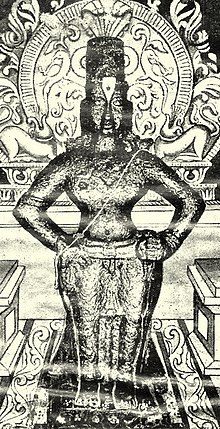
Back فيثوبا Arabic বিথোবা AS বিঠোবা Bengali/Bangla Vithoba German Vithoba Spanish Vithoba Finnish Vithoba French विट्ठल HI Witoba ID ವಿಠ್ಠಲ KN
| Vithoba | |
|---|---|
 The central image at Vithoba Temple in Pandharpur | |
| Devanagari | विठोबा |
| Sanskrit transliteration | Viṭhobā |
| Affiliation | Warkari Vaishnavism |
| Abode | Pandharpur |
| Mantra | Rama Krishna Hare |
| Weapon | Chakra, Shankha |
| Day | Wednesday |
| Mount | Garuda |
| Consort | Rakhumai, Rahi, Satyabhama |
Vithoba (IAST: Viṭhobā), also known as Vitthala (IAST: Viṭṭhala), and Panduranga (IAST: Pāṇḍuraṅga), is a Hindu deity predominantly worshipped in the Indian states of Maharashtra and Karnataka. He is a form of the Hindu deity Vishnu in his avatar: Krishna. Vithoba is often depicted as a dark young boy, standing arms akimbo on a brick, sometimes accompanied by his consort Rakhumai.
Vithoba is the focus of an essentially monotheistic, non-ritualistic bhakti-driven[1][2] Varkari faith in Maharashtra and the Haridasa sect established in Dvaita Vedanta in Karnataka. Vithoba Temple, Pandharpur is his main temple. Vithoba legends revolve around his devotee Pundalik who is credited for bringing the deity to Pandharpur, and around Vithoba's role as a saviour to the poet-saints of the Varkari faith. The Varkari poet-saints are known for their unique genre of devotional lyric, the abhang, dedicated to Vithoba and composed in Marathi. Other devotional literature dedicated to Vithoba includes the Kannada hymns of the Haridasa and the Marathi versions of the generic aarti songs associated with rituals of offering light to the deity. The most important festivals of Vithoba are held on Shayani Ekadashi in the month of Ashadha, and Prabodhini Ekadashi in the month of Kartika.
The historiography of Vithoba and his sect is an area of continuing debate, even regarding his name. Though the origins of both his sect and his main temple are likewise debated, there is clear evidence that they already existed by the 13th century.
- ^ Zelliot and Berntsen (1988) p. xviii "Varkari cult is rural and non-Brahman in character"
- ^ Sand (1990), p. 33 "According to Raeside the Varkari tradition is essentially monotheistic and without ritual, and, for this tradition, Vithoba represents Hari Krsna, while for the badavas or hereditary priests "Vithoba is neither Visnu nor Siva. Vithoba is Vithoba (...)"; p. 34 "the more or less anti-ritualistic and anti-brahmanical attitudes of Varkari sampradaya."